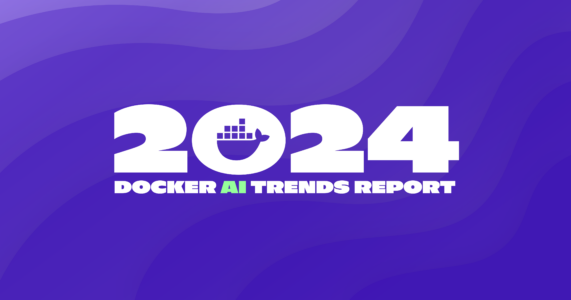Update: The full 2024 State of Application Development Report is available now.
The landscape of application development is rapidly evolving, propelled by the integration of Artificial Intelligence (AI) into the development process. Results in the Docker AI Trends Report 2024, a precursor to the upcoming State of Application Development Report, show interesting AI trends among developers, highlighted in this report.
The most recent Docker State of Application Development Survey results offer insights into how developers are adopting and utilizing AI, reflecting a shift toward more intelligent, efficient, and adaptable development methodologies. This transformation is part of a larger trend observed across the tech industry as AI becomes increasingly central to software development.
The annual Docker State of Application Development survey, conducted by our User Research Team, is one way Docker product managers, engineers, and designers gather insights from Docker users to continuously develop and improve the suite of tools the company offers. For example, in Docker’s 2022 State of Application Development Survey, we found that the task for which Docker users most often refer to support/documentation was creating a Dockerfile (reported by 60% of respondents). This finding helped spur the innovation of Docker AI.
More than 1,300 developers participated in the latest Docker State of Application Development survey, conducted in late 2023. The online survey asked respondents about what tools they use, their application development processes and frustrations, feelings about industry trends, Docker usage, and participation in developer communities. We wanted to know where developers are focused, what they’re working on, and what is most important to them.
Of the approximately 1,300 respondents to the survey, 885 completed it. The findings in this report are based on the 885 completed responses.
Who responded to the Docker survey?
Respondents who took our survey ranged from home hobbyists to professionals at companies with more than 5,000 employees. Forty-two percent of respondents are working for a small company (up to 100 employees), 28% of participants say they work for mid-sized companies (between 100 and 1,000 employees), and 25% work for large companies (more than 1,000 employees).
Well over half of the respondents were in engineering roles — for example, 36% of respondents identified as back-end or full-stack developers; 21% were DevOps, infrastructure managers, or platform engineers; and 4% were front-end developers. Other roles of respondents included dev/engineering managers, company leadership, product managers, security roles, and AI/ML roles. There was nearly an even split between respondents with more experience (6+ years, 54%) and less experienced (0-5 years, 46%).
Our survey underscored a marked growth in roles focused on machine learning (ML) engineering and data science within the Docker ecosystem. In our 2022 survey, approximately 1% of respondents represented this demographic, whereas they made up 8% in the most recent survey. ML engineers and data scientists represent a rapidly expanding user base. This signals the growing relevance of AI to the software development field, and the blurring of the lines between tools used by developers and tools used by AI/ML scientists.
More than 34% of respondents said they work in the computing or IT/SaaS industry, but we also saw responses from individuals working in accounting, banking, or finance (8%); business, consultancy, or management (7%); engineering or manufacturing (6%), and education (5%). Other responses came in from professionals in a wide range of fields, including media; academic research; transport or logistics; retail; marketing, advertising, or PR; charity or volunteer work; healthcare; construction; creative arts or design; and environment or agriculture.
Docker users made up 87% of our respondents, whereas 13% reported that they do not use Docker.
AI as an up-and-coming trend
We asked participants what they felt were the most important trends currently in the industry. GenAI (40% of respondents) and AI assistants for software engineering (38% of respondents) were the top-selected options identified as important industry trends in software development. More senior developers (back-end, front-end, and full-stack developers with over 5 years of experience) tended to view GenAI as most important, whereas more junior developers (less than 5 years of experience) view AI assistants for software engineering as most important. This difference may signal varied and unique uses of AI throughout a career in software development.
It’s clearly trendy, but how do developers really feel about AI? The majority (65%) agree that AI is a positive option, it makes their jobs easier (61%), and it allows them to focus on more important tasks (55%). A much smaller number of respondents see AI as a threat to their jobs (23%) or say it makes their jobs more difficult (19%).
Interestingly, despite high usage and generally positive feelings towards AI, 45% of respondents also reported that they feel AI is over-hyped. Why might this be? It’s not fully clear, but when this finding is considered alongside responses to perception of job threat, one possible answer could be entertained: respondents may be viewing AI as a critical and useful tool for their work, but they’re not too worried about the hype of it replacing them anytime soon.
How AI is used in the developer’s world
We asked users what they use AI for, how dependent they feel on AI, and what AI tools they use most often. A majority of developers (64%) already report using AI for work, underscoring AI’s penetration into the software development field. Developers leverage AI at work mainly for coding (33% of respondents), writing documentation (29%), research (28%), writing tests (23%), troubleshooting/debugging (21%), and CLI commands (20%).
For the 568 respondents who indicated they use AI for work, we also asked how dependent they felt on AI to get their job done on a scale of 0 (not at all dependent) to 10 (completely dependent). Responses ranged substantially and varied by role and years of experience, but the overall average reported dependence was about 4 out of 10, indicating relatively low dependence.
In the developer toolkit, respondents indicate that AI tools like ChatGPT (46% of respondents), GitHub Copilot (30%), and Bard (19%) stand out as most frequently used.
Conclusion
Concluding our 2024 Docker AI Trends Report, Artificial Intelligence is already shifting the way software development is approached. The insights from more than 800 respondents in our latest survey illuminate a path toward a future where AI is seamlessly integrated into every aspect of application development. From coding and documentation to debugging and writing tests, AI tools are becoming indispensable in enhancing efficiency and problem-solving capabilities, allowing developers to focus on more creative and important work.
The uptake of AI tools such as ChatGPT, GitHub Copilot, and Bard among developers is a testament to AI’s value in the development process. Moreover, the growing interest in machine learning engineering and data science within the Docker community signals a broader acceptance and integration of AI technologies.
As Docker continues to innovate and support developers in navigating these changes, the evolving landscape of AI in software development presents both opportunities and challenges. Embracing AI as a positive force that can augment human capabilities rather than replace them is crucial. Docker is committed to facilitating this transition by providing tools and resources that empower developers to leverage AI effectively, ensuring they can remain at the forefront of technological innovation.
Looking ahead, Docker will continue to monitor these trends, adapt our offerings accordingly, and support our user community in harnessing the full potential of AI in software development. As the industry evolves, so too will Docker’s role in shaping the future of application development, ensuring our users are equipped to meet the challenges and seize the opportunities that lie ahead in this exciting era of AI-driven development.
Learn more
- Read the full 2024 State of Application Development Report.
- Introducing a New GenAI Stack: Streamlined AI/ML Integration Made Easy
- Get started with the GenAI Stack: Langchain + Docker + Neo4j + Ollama
- Building a Video Analysis and Transcription Chatbot with the GenAI Stack
- Docker Partners with NVIDIA to Support Building and Running AI/ML Applications
- Build Multimodal GenAI Apps with OctoAI and Docker
- How IKEA Retail Standardizes Docker Images for Efficient Machine Learning Model Deployment
- Case Study: How Docker Accelerates ZEISS Microscopy’s AI Journey
- Docker AI: From Prototype to CI/CD Pipeline solutions brief
- Containerize a GenAI app (use case guide)
Docker’s User Research Team — Olga Diachkova, Julia Wilson, and Rebecca Floyd — conducted this survey, analyzed the results, and provided insights.
For a complete methodology, contact uxresearch@docker.com.



